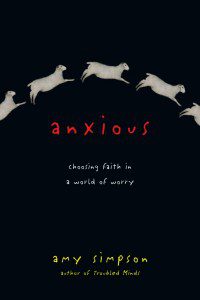 Most Christians are well aware of what Scripture has to say about worry.
Most Christians are well aware of what Scripture has to say about worry.
Our Pinterest boards and Facebook timelines testify to it: image after image of serene sunrises, placid oceans, fair skies, and green meadows is emblazoned with delicate cursive script reminding us to “Be anxious for nothing,” to “Fear not,” to “Cast all [our] cares on God,” and “Do not worry about tomorrow.”
We understand and believe, in theory, that worry is a lack of faith. And yet, as John MacArthur has said, “Worry is the sin…that Christians commit perhaps more frequently than any other.”
In Amy Simpson’s latest book Anxious: Choosing Faith in a World of Worry, she examines the cause of this disconnect. Her conclusions are both convicting and profound.
As a starting point, Simpson notes that the sin of worry is one we tend to see as “other people’s” problem. We tend to think that the things we worry over are “acceptable,” that our level of worry is appropriate or even necessary. In fact, Simpson writes:
“Worry is part of our culture, an expectation of responsible people. We seem to equate worry with good citizenship and awareness. We are expected to remain on emotional ‘high alert’ as evidence that we care about the world around us. Our attitude is, to paraphrase a bit of bumper-sticker wisdom, ‘If you’re not worried, you’re not paying attention.’”
Specifically, Simpson writes that we feel nearly obligated to worry about (1) our jobs (Will I lose my job? Will I find a job? Will I be promoted? Will I have to sacrifice too much for my job?), (2) our parenting (Are my kids eating right? Do they have the right kind of friends? Are their grades good enough? Are they safe? Are they happy? Are they taking life seriously?), and (3) the latest civic issues (the economy, the schools, health care, politics). In fact, if we are not worried about these things, we’re considered abnormal, negligent, or out of touch. This “appropriate” type of worry is encouraged via social media, where we gain acceptance by publicly concerning ourselves about the “right” things and where we glean approval for our worry through the “likes” of our friends and followers. Worrying appropriately becomes nearly a badge of honor: we are considered informed and aware and “good” for having the right kinds of concerns.
The problem is that worry is still a sin, and the Bible is very clear that no worry is our standard. Obsessive, all-consuming, large worry is a sin, yes, but so is low-grade, nagging, small worry. What we need to rectify this problem, Simpson argues, is both a clear theology of worry and a clear knowledge of how to quit the sin of worry.
Over the course of Anxious, Simpson makes the case for why even culturally-appropriate worry is damaging and offers as an alternative the concept of Sabbath. By “Sabbath,” she doesn’t mean just a day of rest, but a life in which our souls are at rest, a state which requires both confession of the sin of worry and a commitment to place our trust repeatedly, constantly, daily, and even moment-by-moment in God. She writes in one especially convicting statement that “For people who claim to trust in God, worry is unnecessary, hypocritical and insulting to him.”
For those who read Anxious carefully and are willing to humble themselves and open their minds to the possibility that they may in fact be “worriers,” this book will undoubtedly change the way lives are lived. While we may be familiar with many of the most commonly quoted verses of Scripture about worry, Simpson takes her readers through an extended study of both Old and New Testament cases, examining how worry is described, its consequences, and how it is dealt with. The sheer number of times Scripture presents us with the admonishment to not worry and trust God reveals God’s awareness of how we would struggle with this particular sin. By the end of the book, there is no way to beat around the bush. Any level of worry is unacceptable, and individuals who worry need to reevaluate their theology. Worry has numerous detrimental effects, the most serious being that it inhibits our relationship with God and demonstrates to the world a lack of faith.
I can imagine that the message of Anxious may be unpopular, but its unpopularity will undoubtedly be because it rings so deeply of truth. What the Bible tells us to do with our worry requires Christians to respond in ways that are deeply counter-cultural. It requires us to throw away the “American” ideal that we deserve or can industriously earn a life of “ease and prosperity.” By contrast, Jesus told us to expect trouble. It requires us to throw away the belief that we have control over our circumstances. But fortunately, as Anxious reiterates: God is in control, God knows what we need, and no matter what we are going through, He will never leave us alone.
Simpson’s message is in line with the Gospel; that is, it is a message of hope. As I read this book, I felt over and over again that sensation that God was calling me to give something up—in this case, worries over various things—and at the same time fear that I wouldn’t somehow be okay if I stopped worrying. I’m certain this irrational, unscriptural response will afflict many readers. But such discomfort is always, to me, a sure sign that release is essential. That the burden of turning against cultural instincts will be light and easy to bear, and, indeed, in actuality, a source of greater freedom and greater relationship with God. I am grateful this book crossed my path. I hope many other readers will be changed by it as well.
For more conversation on Anxious, visit the Patheos Book Club here.
 Amber M. Stamper holds a Ph.D. in English (Rhetoric and Composition) and is an Assistant Professor of Language, Literature, and Communication at Elizabeth City State University in North Carolina. Her research and publications center on religious rhetoric and communication, especially issues of Christian evangelism and the digital church.
Amber M. Stamper holds a Ph.D. in English (Rhetoric and Composition) and is an Assistant Professor of Language, Literature, and Communication at Elizabeth City State University in North Carolina. Her research and publications center on religious rhetoric and communication, especially issues of Christian evangelism and the digital church.












